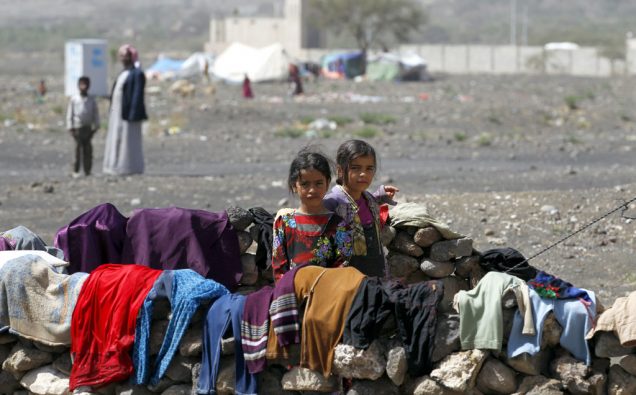
Conflicts raging in the Middle East and Africa are not only inflicting death and destruction but also making lives miserable for survivors.
Two United Nations agencies warned the UN Security Council this week said the multiple wars and conflicts around the world have pushed more than 56 million people into “crisis” or “emergency” levels of food insecurity and are hindering efforts to eradicate malnutrition.
A series of 17 country briefs prepared for the Security Council by the UN Food and Agriculture Organization (FAO) and UN World Food Programme (WFP), reveal that Yemen and Syria top the list in terms of sheer numbers of people whose food security is being negatively impacted.
“Conflict is a leading cause of hunger – each famine in the modern era has been characterized by conflict,” FAO Director-General José Graziano da Silva and WFP Executive Director Ertharin Cousin said in a joint statement.
“[It] undermines food security in multiple ways: destroying crops, livestock and agricultural infrastructure, disrupting markets, causing displacement, creating fear and uncertainty over fulfilling future needs, damaging human capital and contributing to the spread of disease among others.”
According to the organizations, expressed in terms of the Integrated Food Security Classification Phase (IPC) scale, 14 million people – more than half the population – in Yemen are in a state of hunger crisis or emergency. Indeed 8.7 million people – 37 per cent of the pre-conflict population – in Syria need urgent food, nutrition and livelihoods assistance.
A staggering 89 per cent of all Syrian refugees currently in Lebanon also require urgent food, nutrition and livelihoods assistance.
In South Sudan, where the situation is rapidly deteriorating, 4.8 million people are in urgent need of food, nutrition and livelihoods assistance. Similarly, millions of people are still wrestling with high levels of food insecurity in countries that are coming out of extended periods of civil strife such as the Central African Republic (CAR) and Colombia.
The UN bodies also warned that post-conflict countries with high food insecurity are 40 per cent more likely to relapse into conflict within a 10-year timespan if hunger levels are not addressed.
In other countries, while the overall absolute numbers of people facing food insecurity are lower, the share of people experiencing severe levels of food insecurity accounts for over half of the total population.
In Burundi and Haiti, 23 per cent and 19 per cent of people are at IPC level 3 or 4, respectively, while in the CAR, 50 per cent of the population is at IPC scale 3 or worse.
The IPC scale is an evidence-based approach which allows comparability of situations across countries and over time. According to the scale, levels 3 and 4 represent crisis and emergency levels, respectively, and level 5, the highest level, indicates the famine.
Recent estimates say approximately half of the global poor now live in states characterized by conflict and violence. In such places, the people can be up to three times more likely to be undernourished than those living in more stable areas.
“Addressing hunger can be a meaningful contribution to peacebuilding,” emphasized Graziano da Silva and Ms. Cousin, adding, “The 2030 Agenda [2030 Agenda for Sustainable Development] recognizes peace as a vital threshold condition for development, as well as a development outcome in its own right.”














